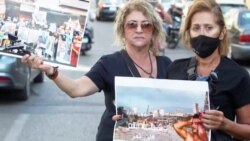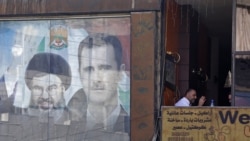On August 7, Hassan Nasrallah, secretary general of Lebanon’s Hezbollah party, rejected accusations of responsibility for last year’s massive explosion that killed hundreds in Beirut.
Nasrallah’s comments, which came in a speech a few days after the first anniversary of the blast, were broadcast on Al-Manar, the Hezbollah-owned television channel in Lebanon. He denied that Hezbollah had stockpiled the explosives that blew up.
“From the outset, many politically motivated people accused Hezbollah, before any investigations, claiming Hezbollah had stored weapons that exploded,” he said.
Nasrallah’s blame shifting is misleading. In fact, there is compelling evidence that Hezbollah had control over facilities at the Beirut port where the ammonium nitrate explosive material had been stored.
Furthermore, Hezbollah and friends have been accused more than once of stockpiling and transporting explosives, including ammonium nitrate, a fertilizer that can be used to make bombs.
For the record, the United States, European Union and others regard Iran-backed Hezbollah as a terrorist group. The U.S. claims Hezbollah was involved in 1983 bomb attacks that killed hundreds of Marines and others in Lebanon. The group has been engaged in Lebanese politics since at least 1992; some dispute whether Hezbollah was behind the 1983 bombings.
Also for the record, a gigantic cache of ammonium nitrate had been stored in dilapidated warehouse No. 12 at Beirut’s port since 2013.
When it blew up on August 4, 2020, at least 218 people died; another 7,000 were injured and 300,000 were displaced. Experts said it was the third-largest non-nuclear explosion in history.
Thousands of angry Lebanese took to the streets to protest government negligence and demand answers and accountability for the tragedy. Some called for politicians to be hanged.
In denying blame, Hezbollah attempted to discredit investigators looking into the blast, accusing them of being politically driven and part of a U.S. and Israeli scheme. But media reports soon revealed a connection between the party and the explosives warehoused at the port.
The Lebanese government has said 2,750 tons of ammonium nitrate ended up there from the Rhosus, a Moldovan-flagged ship owned by Russian national Igor Grechushkin. The ship, en route to Mozambique, had purportedly stopped to pick up some seismic survey equipment.
Once docked, however, port officials inspecting the ship deemed it unseaworthy. Its explosive cargo was off-loaded and its crew repatriated, the government’s official account says.
In January, however, Foreign Policy magazine reported that the ammonium nitrate may have been intended for the Syrian regime of Bashar al-Assad, a Hezbollah ally.
As evidence, the Foreign Policy report cited a document showing that a chemical factory in Georgia, Rustavi Azot, was the seller, while the buyer was Savaro, a London-registered firm run by three Syrian-Russian citizens – businessman George Haswani and brothers Mudalal and Imad Khuri. The three businessmen had close ties to the Assad government.
According to Foreign Policy:
“Widely known as Moscow’s man in Damascus, [Haswani] has a history of brokering deals with jihadi outfits as well as regime-backed shabiha, or militias. A Syrian businessman from Yabroud, Haswani’s birthplace, spoke to FP on the condition of anonymity and said: 'Haswani is known to resolve disputes between locals and shabiha. But he also knew ISIS and [the Nusra Front].' … In 2015, Haswani was sanctioned by the United States for allegedly buying oil for the regime from the Islamic State, which controlled oil-rich parts of Syria at the time.”
And in July 2019, the U.S. Treasury Department sanctioned Hezbollah’s security chief, Wafiq Safa, for allegedly using “Lebanon's ports and border crossings to smuggle contraband and facilitate travel on behalf of Hizballah, undermining the security and safety of the Lebanese people, while also draining valuable import duties and revenue away from the Lebanese government.”
In an analysis published in June by Chatham House, an independent think tank in London, Lina Khatib wrote that Hezbollah has “de facto control over Lebanon’s border with Syria,” smuggling fuel, drugs and weapons. Khatib added the group also has strong ties with key Lebanese government ministers who have sway over the Beirut port, including former Transportation Minister Yusuf Finyanus.
In September 2020, the U.S. Treasury sanctioned Finyanus for providing material support to Hezbollah and engaging in corruption, and noted that he regularly met with Safa in 2015.
In July 2019, Israeli Ambassador to the United Nations Danny Danon warned the U.N. Security Council that Iran was smuggling weapons to Hezbollah through Beirut’s port, exploiting civilian maritime channels. Danon remarked that the “[t]he Port of Beirut is now the Port of Hezbollah.”
Hezbollah has also stored explosive materials in other parts of the world.
Al Monitor, a media platform specializing in coverage of the Middle East, reported that the U.S. State Department’s top counterterrorism official, Nathan Sales, accused Hezbollah of stockpiling ammonium nitrate in multiple European countries.
“Since 2012, Hezbollah has established caches of ammonium nitrate throughout Europe, by transporting first-aid kits whose cold packs contain the substance,” Sales said.







